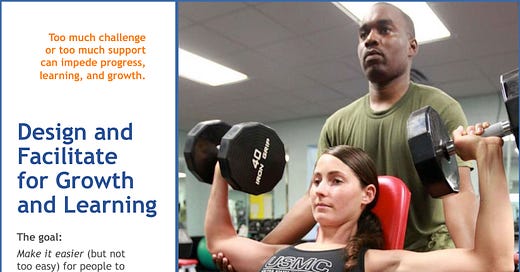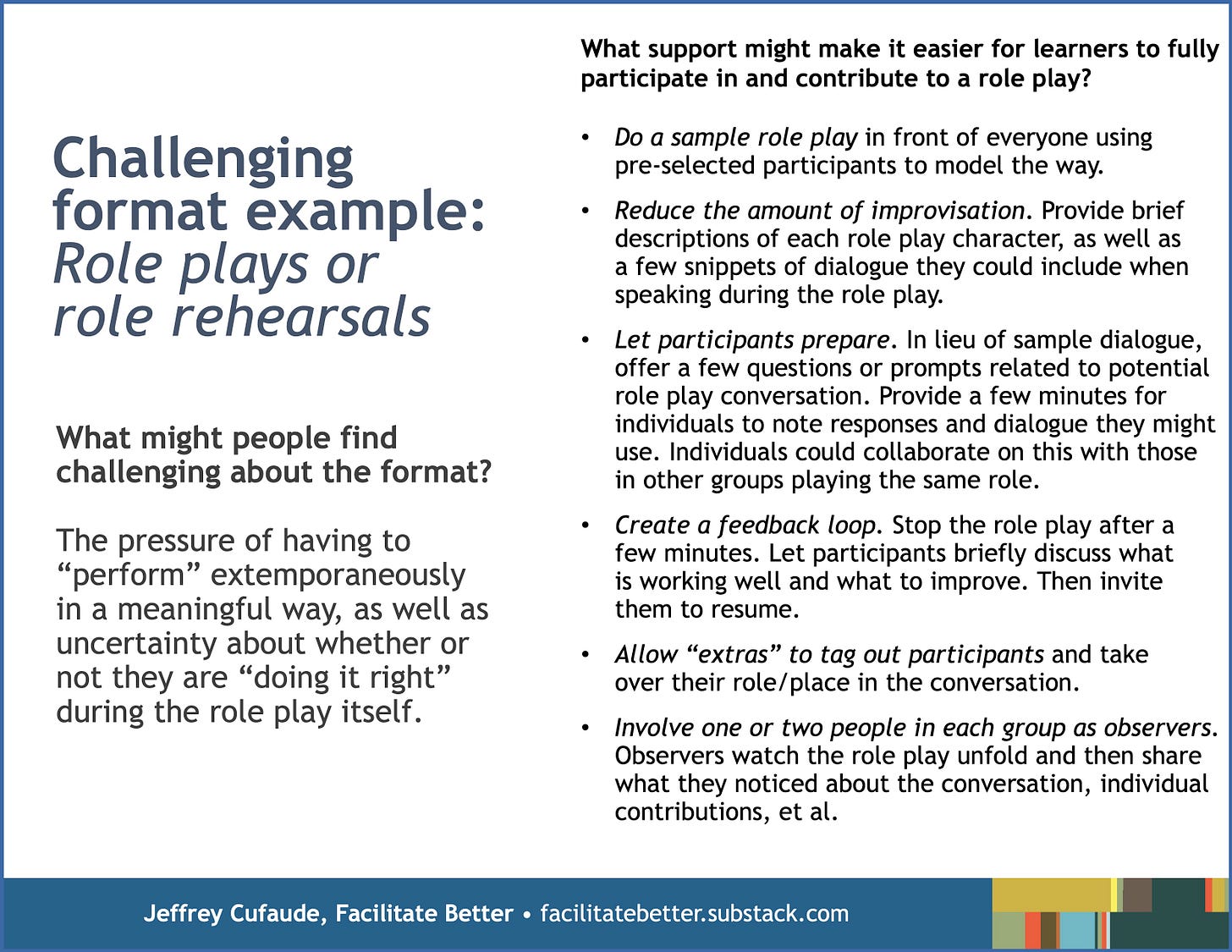Design and Facilitate for Growth and Learning (Facilitation Friday #10)
One of the core principles of effective facilitation
For stronger physical muscles, you lift more challenging weight.
For stronger mental muscles, you take on more challenging content and conversation.
The effective design and facilitation of growth-producing meetings and learning experiences makes it easier (but not too easy) for participants take on heavier lifts.
How growth occurs: challenge and support
To better understand this growth dynamic we can turn to a simple framework from psychologist and scholar Nevitt Sanford: challenge and support.
Challenge, provided by either internal or external stimuli, can lead to growth and development so long as the disequilibrium it causes does not overwhelm the individual. If it does, the person may retreat or shut down.
Support is an influence (usually external) that helps an individual successfully navigate the challenge being experienced without coddling the person so much that growth and development are impeded.
To illustrate this in action, let’s return to lifting weights. Imagine you select a weight you confidently know you can lift 10 times. You may feel satisfied upon completing the reps, but because your muscles weren't challenged, any growth will be minimal.
To gain muscle mass, you generally have to lift heavier than you normally do. Since doing so increases the challenge and the possibility of muscle failure, it helps to have a spotter. A spotter can assist with the weight if necessary.
Good spotters don't grab the weights immediately when you start to strain, but instead step in when your muscles are clearly close to failure or your safety is a concern. Jumping in too early would deprive you of the challenge your muscles need to grow.
Understanding the dynamics of challenge and support helps us design more effective meetings, workshops, and conversations, as well as facilitate what happens during them.
Challenge and support in action
Think about the individuals you facilitate. What content, environment, session formats, conversations, et al, might challenge them? What support or spotting might help them successfully navigate any challenges instead of retreating or shutting down? What support might be excessive, unintentionally impeding their learning and growth because too much challenge was eliminated?
Here are a few common meeting and workshop examples:
Analytical individuals might struggle with an exercise that has vague instructions or asks them to engage in an abstract creative task. Offering more detailed information or an example of a possible creation could ease their initial discomfort.
Workshop designs or meeting formats that define engagement almost exclusively as verbal participation may impede contributions from more introverted or reflective individuals. Providing time for individuals to think on their own before verbalizing their ideas supports their interaction and learning.
Individuals from very different personal or professional backgrounds could struggle with challenging content if the presenter does not offer—or help surface—concrete examples of how it applies to their respective contexts.
If your design eliminates traditional or expected norms (nametags at a conference, assigned seats at a meeting, presentation slides or handouts, et al), participants could be confused about how to engage. This doesn't mean you can’t get rid of these items. Just consider how to help participants navigate any confusion or challenge their absence might cause.
A group accustomed to unstructured informal conversations could become hesitant or challenged if an intense conflict erupts. More assertive facilitation and introducing clear conversation structure could support people working through the disagreement.
If a workshop covers content that participants already know extremely well, they may learn little if the speaker does not adjust to include more challenging material.
A circle of chairs and a flipchart listing only a few discussion questions might challenge or overwhelm a group that always meets at a conference table and with a highly detailed agenda.
Individuals accustomed to lecture-style presentations may be uncomfortable with a highly experiential workshop that includes a great deal of interpersonal sharing.
A few practical tips
Assess what individuals will find challenging to inform your content and design choices.
Survey people in advance whenever possible
Poll on-site or online (at the beginning and/or at the start of select content blocks)
Calibrating content and processes or formats based on what you learn requires extra prep in both areas. Doing so makes it easier for you to seamlessly shift to more (or less challenging) options based on what unfolds in real-time, as well as adjust the level of support you provide.
Create opportunities for people to challenge themselves, selecting content and conversations they perceive will be a “heavier lift.”
In a workshop, you could include discussion questions, case studies, reading assignments, et al, of varying difficulty and let participants select what will challenge them as they desire.
When appropriate in meetings, you can ask a group to consider if their discussions reflect the most challenging thinking, topics, ideas, or concerns.
Carefully select when and how you offer support. A few possibilities include:
Directly provide the support without it being requested. (This might help you out … )
Offer the support and provide if requested. (Would you like a hint? or I wonder if you’d like a little guidance?)
Have “support yourself” options available that people can access as they desire. This could be a handout with additional information or guidance, a resource area, coaches, or links to online resources.
As part of your meeting or workshop evaluation, assess perceived challenge and support levels, including:
the overall level of challenge in the meeting or workshop
what was most challenging
what was too basic or easy
when more support (a spot) might have been helpful and in what form
Avoid the temptation to spot too soon or too much.
It can be difficult for people to learn if they feel uncomfortable. But sometimes the discomfort is in fact the learning and it should not be assuaged … at least not right away.
Effective facilitation understands, embraces, designs for, and supports both possibilities. We need to allow sufficient time under tension (TUT) for growth and learning to occur without letting people struggle for so long that they totally check out.
As a facilitator you may need to get more comfortable with the discomfort or challenge others experience so that you do not jump in too soon.
Bottom line?
Embedded in the very root definition of the word facilitation is the emphasis on actions that make it easier for groups to accomplish their goals. But if we as facilitators do the work of the group for them or provide too much support, we take away the challenge and reduce the group's (or some individuals’) likely learning and development.
The key is a thoughtful calibration of challenge and support in the original design of your meeting, workshop, or conversation, as well as real-time vigilance in recalibrating your choices in order to produce real growth. It's more art than science, but it is critical nonetheless.
Getting in Action
Do the following for an upcoming meeting or workshop you will facilitate:
Identify the most challenging content segment (either your perception or from participant advance assessment) and determine possible support options.
Identify at least one meeting agenda item or workshop segment where you will invite participants to “challenge themselves,” selecting from discussion questions or case study options you provide.
Consider in what moments you are most likely to spot too soon or too much. Determine how you will keep yourself from doing either.
Related Reading
Design Small Group Work for Better Value (Facilitation Friday #12)
© Facilitate Better and Jeffrey Cufaude. All rights reserved.
To affordably license this content for reprint on your site or in electronic or print communications or to contact me regarding customized facilitation skills workshops or consultations, complete this form.





